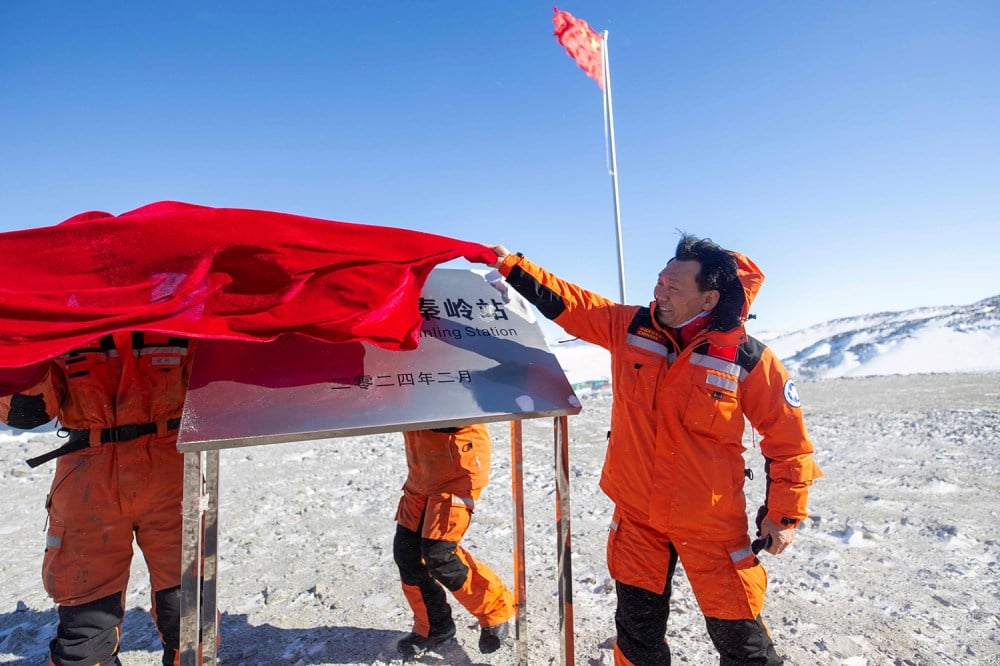China’s and Russia’s recent announcements on expanding their presence in Antarctica are not simply the latest extension of Moscow and Beijing’s “no limits” partnership. Rather, they should be a wakeup call to Washington that the southern continent, long considered geopolitically dormant, is poised for great-power competition.
China’s pronouncement in March that it will build a new Antarctic polar station coincided with Russia’s announced intention to build a new station, restore a long-closed one, and construct an airfield. Beijing’s newest station will be its sixth in Antarctica, along with the airfield it began constructing in 2018. Russia maintains six active stations, with five others currently closed; its recent announcement follows Russian President Vladimir Putin’s statement in January 2024 that Vostok station near the south pole had been successfully modernized.
The construction and modernization of Antarctic stations is not simply a matter of symbolic competition or national prestige. On a continent whose climate makes permanent habitation impossible, research stations are the only way countries can maintain a presence, project territorial claims, and (despite the strict limitations imposed by the 1959 Antarctic Treaty) engage in military activities. The United States has long enjoyed the perks of a station at the south pole, providing unique access for scientific research but also cementing Washington’s leadership in upholding the Antarctic Treaty and the current benign regime governing the continent.
U.S. leadership in Antarctica, however, is increasingly precarious. The goal of the Antarctic Treaty, as summarized by then-U.S. Secretary of State John Foster Dulles during its creation, was to prevent Cold War-era competition from spreading to the Antarctic. In recent decades, China has sought to push, and in some cases exceed, the boundaries of the treaty. People’s Liberation Army (PLA) personnel have been notably active in China’s Antarctic program and, in direct violation of the treaty, Beijing failed to report their presence to its fellow signatories. Similarly unreported, PLA personnel constructed a radar site at China’s Zhongshan station that could reportedly interfere with U.S. polar satellites. China’s newest station, Qinling, is located near the United States’ McMurdo station and equipped with advanced communications gear and satellite ground stations that could potentially provide signals intelligence collection and satellite launch monitoring.
Chinese strategists put an Antarctic twist on their well-known doctrine of “civil-military fusion,” with the 2020 edition of the Chinese military textbook Science of Military Strategy contending that “military-civilian mixing is the main way for great powers to achieve a polar military presence.” The PLA, in keeping with Beijing’s fond tradition of using cartography to signal strategic objectives, has adopted a map that more prominently positions Antarctica and helps elucidate Beijing’s view of the southern continent as a geopolitical pivot point. President Xi Jinping himself has been clear on the Antarctic’s significance, stating in 2014 that Beijing would seek to “understand, protect, and exploit” Antarctica. Qu Tanzhou, the director of the Chinese Arctic and Antarctic Administration, has stated the international community needs time to “make a psychological adjustment” to accept China’s new strength in polar affairs; on Antarctica, he explained that “we are here about the potential of the resources and how to use these resources.”
Indeed, it is China’s increasing determination, often accompanied by Russia, to reshape the rules and norms governing Antarctic behavior that should force a strategic reevaluation in Washington and elsewhere. Under the terms of the Madrid Protocol to the Antarctic Treaty, energy and minerals exploration and extraction are permanently banned on the continent. A bizarre theory gaining traction in Chinese academic circles holds that the protocol will expire in 2048 (when, in reality, it simply comes up for review) and extractive activities can then commence; no legitimate international legal scholar has endorsed such a position. Moscow and Beijing have teamed up in recent years to reject the establishment of new marine protected areas along the Antarctic coast by the Commission for the Conservation of Antarctic Marine Living Resources, another effort to subvert international institutions from within.
Beijing’s strategic studies community is rife with conjecture on the potential exploitation opportunities available in the Antarctic and the surrounding Southern Ocean, which is believed to contain exceptional stocks of energy, minerals, and fish. Anne-Marie Brady, a professor at the University of Canterbury in New Zealand and the preeminent Western scholar of China’s Antarctic ambitions, has noted that China’s expanding polar presence is explained to the Chinese public as “part of China’s efforts to secure a share of polar resources.” Guo Peiqing, a professor at the Ocean University of China, has made Beijing’s long-term approach to the continent clear: “China’s exploration of the continent is like playing chess. It’s important to have a position in the global game. We don’t know when play will happen, but it’s necessary to have a foothold.” The Science of Military Strategy, published by Beijing’s National Defense University in 2020, states that “the polar regions have become an important direction for our country’s interests to expand overseas and far frontiers, and it has also proposed new issues and tasks for the use of our country’s military power.”
But as great-power competition comes to Antarctica, Washington has repeatedly avoided strengthening its own hand in this critical region. The Biden administration did not specifically object to Beijing’s bizarre interpretation of the Madrid Protocol or its efforts to hinder marine conservation in the Southern Ocean. Alarmingly, the United States has not conducted an unannounced inspection, as allowed by the Antarctic Treaty, of any Chinese, Russian, or other non-U.S. station since 2020. Unfortunately, due to logistical constraints, the 2020 inspection did not reach Beijing’s most concerning stations at Zhongshan and Kunlun at Dome A, the continent’s highest ice feature. The geographic locations of these stations make them uniquely suited for signals collection or space warfare activities.
The United States’ long-overdue refocus on the Arctic and High North has not spun off any additional resources to Antarctica. The Polar Security Cutter program, the U.S. Coast Guard’s effort to revitalize its moribund icebreaker program, has experienced significant delays, leaving only one heavy icebreaker currently in service. Additional polar-capable C-130J aircraft are needed for regular resupply in the Antarctic. And, rather than the Biden administration’s milquetoast 2024 National Security Memorandum on United States Policy on the Antarctic Region, the Trump administration should consider a comprehensive U.S. Antarctic strategy similar to the Arctic strategy promulgated in U.S. President Donald Trump’s first term.
A holistic U.S. Antarctic strategy would support a vigorous U.S. presence on the continent, including funding for current U.S. stations and their modernization, as well as the construction of additional stations to project U.S. influence across Antarctica. This presence would require fully resourced air and sea assets for resupply, in addition to conducting inspections of Chinese and Russian stations as permitted by the Antarctic Treaty. Such a strategy would also make clear that the United States, working with partners like Australia and New Zealand, will reject China and Russia’s efforts to subvert the existing international legal framework governing the continent.
While any U.S. Antarctic strategy should reinforce Washington’s support for the treaty and related agreements like the Madrid Protocol, it should also begin preparing the groundwork for worst-case scenarios. As Beijing has shown in international organizations as disparate as the World Intellectual Property Organization and the World Health Organization, it seeks to destroy global norms from within. Washington must prepare for a world in which Beijing’s and Moscow’s actions render the Antarctic Treaty and Madrid Protocol obsolete, even if they technically remain in force, opening Antarctica to significant geopolitical tensions.
In such an environment, the United States should be prepared to rapidly upgrade its stations and construct additional strategic sites throughout the continent. Prioritizing icebreaker construction, including nuclear-powered ones, would be critical, as would the use of unmanned aerial and underwater vehicles by the U.S. Navy and Coast Guard to protect U.S. interests in the Southern Ocean. Specialized U.S. Army and Marine Corps units trained for Arctic warfare could receive additional training for unique Antarctic conditions. Should the Madrid Protocol collapse, which seems likely given Beijing’s activities and declared intentions, Washington should be prepared to undertake seismic mapping, geological surveys, and oceanographic exploration while reserving the right to stake early claims to identified resources. Such claims could even include the declaration of exclusive economic zones surrounding U.S. stations. Finally, in a post-Antarctic Treaty and Madrid Protocol world, the United States needs to start carving out a coalition of like-minded states, including Argentina, Australia, Chile, and New Zealand, who could develop and implement rules of the road in their respective Antarctic zones.
Trump has already redirected focus to core strategic interests in Greenland, the Arctic, and the Western Hemisphere more broadly. His administration has regularly cited concerns about Chinese and Russian activities there in reorienting the United States’ posture toward these areas. As the administration reviews the current security environment in preparation for the upcoming release of the National Defense Strategy, it would do well to consider the Antarctic as another prime candidate for U.S. attention. With China and Russia increasingly assertive and old frameworks breaking down globally, it is time for an America First approach to Antarctica.
The post An America First Policy for the Antarctic appeared first on Foreign Policy.




